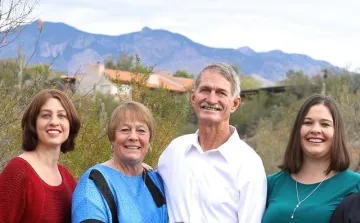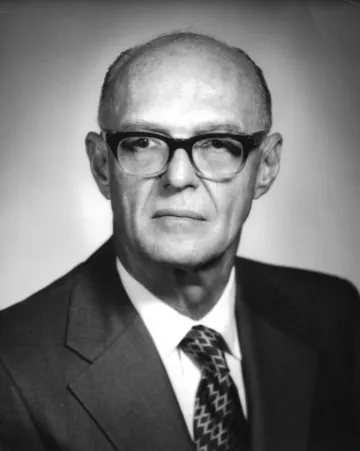Lasting Leadership, Collaborative Giving
The Tucson Foundations have a deep impact on Southern Arizona

The Tucson Foundations are the embodiment of collective giving. Directed by the Lohse family, the 11 private foundations that make up the Tucson Foundations are committed to supporting the communities of Southern Arizona. Their partnership with the University of Arizona has spanned decades, and their impact can be seen throughout campus in the form of scholarships, endowed chairs, community and outreach programs, and facility upgrades.
The Tucson Foundations were established by prominent Tucson estate attorney Ashby Lohse, beginning in the late 1950s. Clients entrusted him to create private foundations in their names, leaving lists of their general philanthropic interests in their wills. After their deaths, their foundations funded their interests.

L-R: Tricia Lohse, Linda Lohse, Bob Lohse, Jennifer Lohse
“When we get a proposal requesting funding, we look at the matchup of which foundation would best fit the category of giving,” explains Linda Lohse, Tucson Foundations’ managing director.
“Several of our donors were educators, so a lot of the money goes towards education, and the university receives a lot of those funds,” she says. “For example, Dr. Roy Graesser of the Graesser Foundation was the head of the math department at the University of Arizona. And some others, like Martha Neff, Lucille Williams and Lillian Calistri, were all elementary school teachers.”
Jennifer Lohse, Tucson Foundations’ vice president of external relations, says the foundations’ goals with the university are threefold: to help Southern Arizona residents earn undergraduate degrees, to support endowed chair positions and to partner with the university to solve community problems.
“The more that the university can be engaged with community organizations or is responding to community needs, those are great programs we like to fund,” Jennifer says. “The Center for Recruitment and Retention of Mathematics Teachers is a perfect example of that, as is Camp Cooper because it’s reaching kids in the community and targeting Southern Arizona folks.”
Jennifer notes the Center for Recruitment and Retention of Mathematics Teachers as a personal favorite and a program likely to have a large community impact. Its mission is to develop, support and retain Arizona math teachers through innovative training and continued education programs, which will ensure that teachers are helping inspire the next generation, for a sustainable state educational system.
The Tucson Foundations are committed to enriching the Tucson community and to providing local nonprofits with efficient ways to seek funding. This is one benefit of operating under the umbrella of the Tucson Foundations, Linda Lohse says. “While each of the foundations is its own corporation, instead of nonprofits requesting funding from 11 different foundations, they can save time and money by submitting just once to us.”
It is the power of the collective in action.
“Some of these foundations are very small, and they don’t have a lot of funding,” Linda says. “But we can combine them. If what’s needed is a $100K grant and we just can’t do that, we could combine four foundations at $25K and make a collective impact. That’s how we operate.”
“Like the Martin Gluck Endowed Chair in the Division of Trauma in Health Sciences,” she says. “That was funded by four different foundations to create that endowed gift.”

Ashby Lohse
Collaborative efforts and strategic investments that ripple out to have wide-reaching impacts across Southern Arizona are what the Tucson Foundations are all about. Jennifer and Linda note that Ashby was particularly proud of funding the Ashby I. Lohse Endowed Chair in Water and Natural Resources Law, because he knew the huge impact it could have on natural resources in the state.
“The faculty that are involved in water law at the university really are leading the charge at the state level,” Jennifer says.
With decades’ worth of projects funded by the Tucson Foundations, it is difficult to find a part of the university their giving has not touched.
“Working with the university has been an honor,” Jennifer says.
—Kim Stoll

